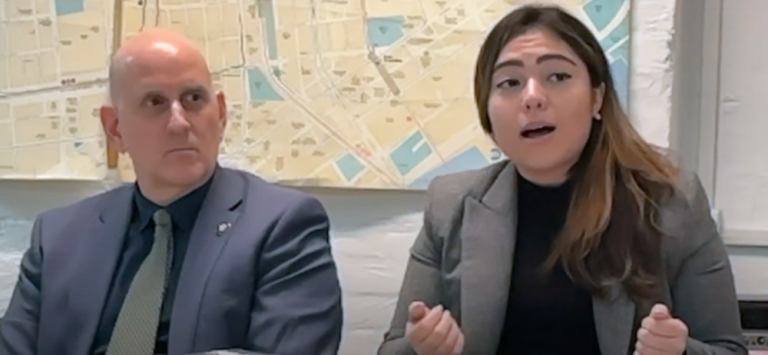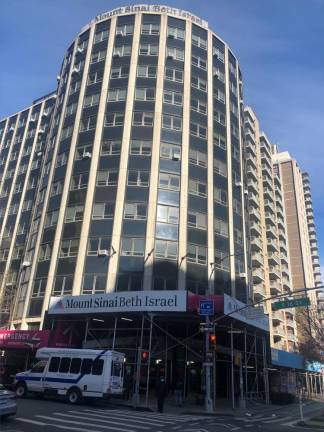Community Group Warns of “Dire Consequences” if Beth Israel Closes; Draws Support from Epstein and Gonzalez
The Community Coalition to Save Beth Israel and NY Eye & Ear Infirmary calls the E. 16th hospital a “lifeline” for Lower Manhattan residents, and says that the underserved community will face “dire consequences” if the hospital closes. Mount Sinai claims that financial losses at the hospital, which have reportedly totaled over $1 billion in the past decade, justify its closure.


A community group says that Lower Manhattan–which is already underserved in terms of available hospital beds–will face “dire consequences” if Mount Sinai is allowed to shut down its Beth Israel Hospital, which is located at E. 16th St. and First Ave.
In an independently conducted Health Equity Impact Report (HEIA), the Community Coalition to Save Beth Israel and NY Eye & Ear Infirmary found that “Lower Manhattan seriously lacks hospital capacity, with only 0.81 hospital beds per 1,000 residents below 14th Street, less than half the statewide rate of 2.4 beds per 1,000.”
If Beth Israel closes, the report reads, this “dire situation” will only grow worse. Overburdened hospitals further uptown would strain to meet the added needs, particularly when it comes to absorbing the more than 60,000 emergency room patients that use the E. 16th hospitals annually.
Essentially, only one major hospital would be left remaining below 28th St., a branch of NewYork-Presbyterian.
The report’s conclusions were drawn from an online survey of 900 local residents. It was necessary, the Community Coalition wrote, because the group “recognized that Mount Sinai would not be required to commission” a similar study under state law.
New York’s Department of Health has already put the brakes on some of the phase-down process that Mt. Sinai initiated. The agency sent a cease-and-desist letter to Mt. Sinai in December, in which they told the corporation to stop shuttering services at the E. 16th St. hospital, prior to a DOH ruling on their plans to shut the facility entirely. Otherwise, Mt. Sinai would face daily fines–or possibly a court order.
State Senator Kristen Gonzalez and State Assembly Member Harvey Epstein held a press conference on Jan. 29–hosted by the nonprofit group Manhattan East Community Association (MECA)–to draw attention to the report.
”A number of people who use [Beth Israel] are Medicaid recipients at a Medicaid-eligible facility,” Epstein pointed out. If the hospital closes, he asked, “where do they go?”
Indeed, 77.2 percent of the people that the Community Coalition surveyed said that they “choose” Beth Israel due to its proximity. One Stuyvesant Town resident told the Coalition that her 95-year-old mother, who also lives in the housing complex, was rushed to Beth Israel when her blood pressure dipped “dangerously low.” She said that “NYU was too far to take her to because she was so unstable. Having an emergency room closer was really lifesaving for her.”
State Senator Gonzalez said that she believes such examples of patient testimony can have a profound impact on the decisions of relevant state agencies.
“I really want these voices to be heard at the very highest level of government,” she said.
The report also notes that “the closing of Beth Israel would have a negative impact on medically underserved residents of Lower Manhattan, especially those who are people with disabilities, older adults (especially frail elderly), LGBTQ+ people, and low-income racially diverse residents.”
Laura Pine, a 59-year-old Greenwich Village resident and a member of the queer community, agreed with the findings.
“There’s a lot of discrimination by doctors based on a patient’s sexual orientation or gender identification. This has never been a problem at Beth Israel,” Pine said. “I had a friend just treated at BI for cancer. She’s trans and she was treated with dignity there.”
Despite the name of the community group, the recent report prioritizes discussing Beth Israel over the NY Eye & Ear Infirmary, which is another Mt. Sinai-owned hospital on E. 14th St. However, the report does briefly acknowledge that the future of the E&E Institute is also “in question, given recent actions by its parent system, Mount Sinai.”
Indeed, Mt. Sinai had previously been seeking to merge the E&E Infirmary under Beth Israel’s broader license. The corporation has run into some headwinds on that front, however, as the DOH’s Public Health and Health Planning Council has put significant conditions on any final approval of the merger.
According to a letter issued by the Planning Council and obtained by the blog EV Grieve, these conditions include Mt. Sinai “not closing any NYE&EI clinical programs,” changing “access to clinical services” or closing “inpatient beds.”
In a “Voices” column published in Chelsea News last November, the MD Marc Lavietes elaborated that “MSBI must resubmit a revised [merger] proposal by June 13, 2024 or the project will be tabled.”
Conversely, a spokesperson for the DOH told Straus News that “there is no hard deadline for a merger proposal.”
Local activists worry that Mount Sinai plans to close the E&E Infirmary in order to reap a multi-million dollar windfall, by selling its plot to a real estate developer.
Mount Sinai has claimed that Beth Israel has lost over $1 billion over the past decade, and that it should close before accruing more losses.
Reached for comment by Straus News, a spokesperson for Mt. Sinai said that “MSBI’s 16th St. campus is outdated, and its deteriorating infrastructure continues to decline. The 16th Street facility is operating at roughly 20 percent capacity and has lost approximately $150 million in 2023 alone.”
The hospital spokesperson added that Mt. Sinai doesn’t deem Beth Israel to be a sufficiently “modern” facility. Echoing the Community Coalition but advocating for the exact opposite outcome, they also claimed that not closing the hospital “puts the entire health system at risk.”
In a nod to their struggles convincing the Department of Health–not to mention the surrounding neighborhood–that such a closure is necessary, the statement concluded that “it is important to us and to everyone that we have clear plans in place as we move through this process, which is why we are continuing to work with NYS DOH to ensure a seamless transition for our patients and community.”
The Community Coalition to Save Beth Israel and the NY Eye & Ear Infirmary says residents in lower Manhattan will face “dire consequences” if Beth Israel closes, noting its emergency room serves over 60,000 patients a year.